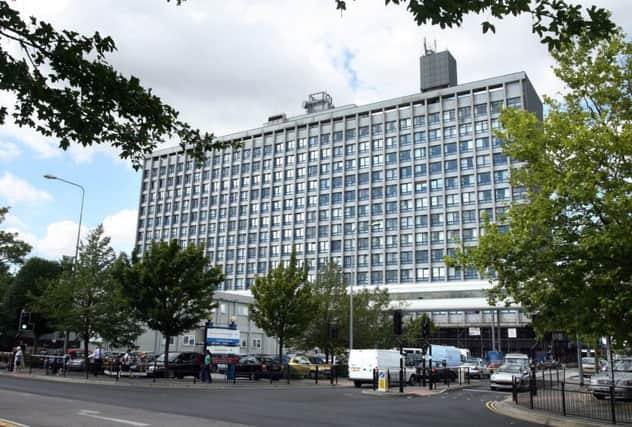Young athlete dies after rookie A&E doctor fails to spot she has meningitis


Ellie Penrose, 18, who was a promising triathlete, was taken to hospital by her worried family after complaining of a headache and sensitivity to light.
She was seen by newly-qualified Dr Don Hettiarachchi who diagnosed gastroenteritis and dehydration and sent her home with paracetamol and ibuprofen.
Advertisement
Hide AdAdvertisement
Hide AdBut an inquest heard she was ‘inappropriately discharged’ from the infirmary after the ‘failure in care’.
Hours later her parents Tom and Pauline dialled 999 after finding her critically-ill on her bed at their home.
She was rushed to hospital but died later the same day from “overwhelming sepsis”, caused by meningococcal septicaemia.
Ironically, hours before she died last August Ellie discovered she had excelled in her A-levels and was destined for university.
Advertisement
Hide AdAdvertisement
Hide AdDr Hettiarachchi admitted to the Hull inquest he was “not 100 per cent sure” of the root cause of Ellie’s illness when he saw her in the hospital at 3am on August 12 last year.
With no consultant available he consulted with fellow trainee Dr Ayman Ghoneim in a corridor before discharging her.
Coroner Professor Paul Marks asked if he had considered meningitis and Dr Hettiarachchi replied: “I did. When I examined her there was no rash. There was blotching on her face. I felt it was more viral.”
Questioned by the Penrose family’s lawyer, Dr Hettiarachchi added: “I did not treat it as meningitis because I felt it didn’t fit with the general picture.”
Advertisement
Hide AdAdvertisement
Hide AdAsked if he would have done anything differently, he replied: “Lots of things. I would have consulted with a registrar or above.”
Dr Hettiarachchi accepted he did not highlight key observations - crucially, Ellie’s high blood pressure, low pulse rate and skin blotching - to Dr Ghoneim, but denied a claim that he had already reached a diagnosis.
Dr Ghoneim told the inquest: “He (Dr Hettiarachchi) said observations were normal.”
Mrs Penrose said Ellie, a student at private Hymers College in Hull,
Advertisement
Hide AdAdvertisement
Hide Ad“Ellie was full of fun and energy, always smiling, very fit. She was just a really nice person.”
had felt tired the day before she died.
She said: “At 6.30pm I told Ellie that tea was ready. She said that she had a headache and could not bear the light being on. I was becoming concerned and rang NHS Direct.”
Mrs Penrose, from Cottingham, East Yorks., was advised to take her daughter to her local East Riding Community Hospital in Beverley where they arrived at 9pm.
She added: “A nurse announced that staff were dealing with two serious cases.
Advertisement
Hide AdAdvertisement
Hide Ad“Unless you presented with a serious medical condition you were told to leave A&E.”
The mother and daughter were advised to go to A&E and they arrived at Hull Royal Informing at 11pm where they were eventually seen by Dr Hettiarachchi.
“The doctor said Ellie was dehydrated and was suffering from gastroenteritis,” said Mrs Penrose.
She was too ill to collect her A-level results at 7.30am but discovered online that she had been awarded a place at the University of York to study maths.
Advertisement
Hide AdAdvertisement
Hide AdShortly afterwards, she complained of pins and needles in her face, neck and back.
An ambulance was called and took Ellie - now complaining of abdominal pain - back to A&E.
She was seen quickly at 11.30am, but was not given antibiotics until 1pm, around the same time a scan revealed her body was in “shutdown”. She died a short time later.
Dr Mark Simpson, clinical director for emergency medicine at Hull and East Yorkshire Hospitals NHS Trust, wrote a serious incident report after the death.
Advertisement
Hide AdAdvertisement
Hide AdHe said there had been “a failure in care” and Ellie had been “inappropriately discharged”.
He criticised the delay in administering antibiotics, while denouncing “human errors made by junior doctors” and “the failure to identify key observations”.
Dr Simpson said Ellie would have had the “optimum” chance of survival had antibiotics been administered at 3am, but was unable to say if she would have lived.
The coroner adjourned the hearing, saying he wanted an expert to assess whether she would have survived if she had been given antibiotics sooner.
Advertisement
Hide AdAdvertisement
Hide AdKevin Phillips, chief medical officer for Hull and East Yorkshire Hospitals NHS Trust, said: “It is clear that this is a very tragic case.
“Our thoughts are with her family at this difficult time, and we are very sorry for their loss.”